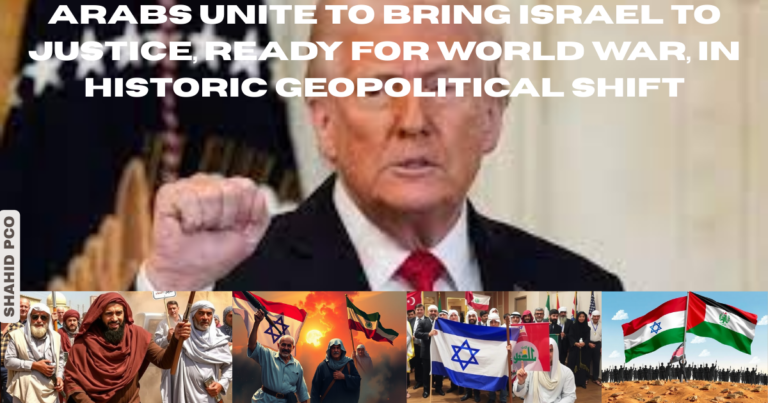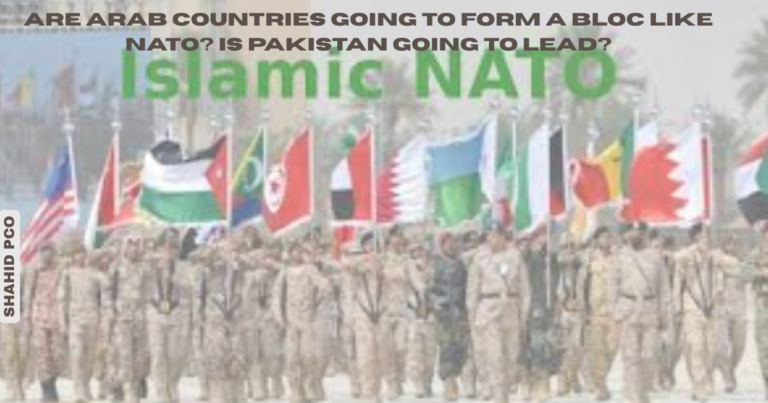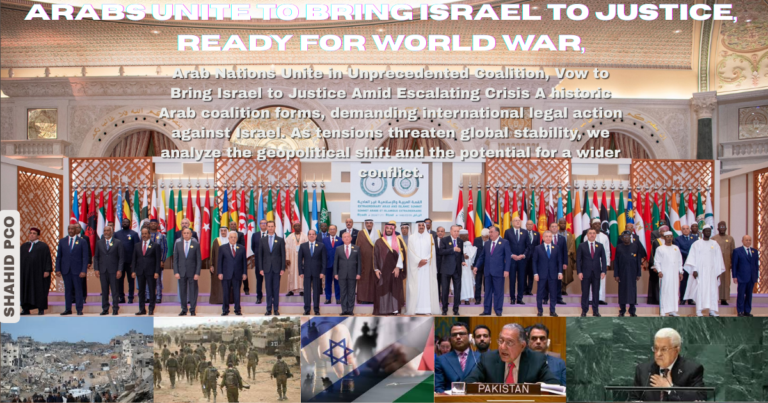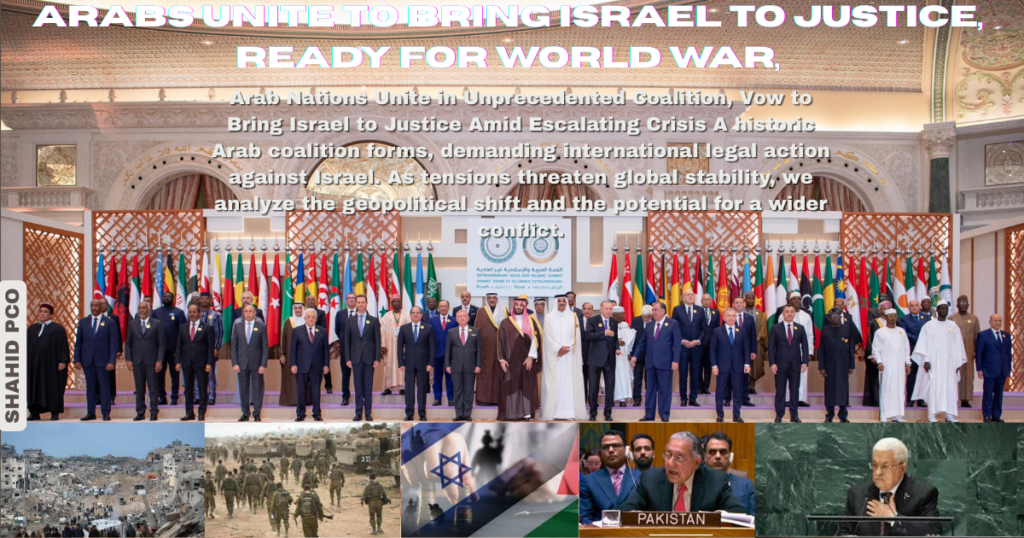
Arabs unite to bring Israel to justice, ready for world war,
Arab Nations Unite in Unprecedented Coalition, Vow to Bring Israel to Justice Amid Escalating Crisis A historic Arab coalition forms, demanding international legal action against Israel. As tensions threaten global stability, we analyze the geopolitical shift and the potential for a wider conflict.
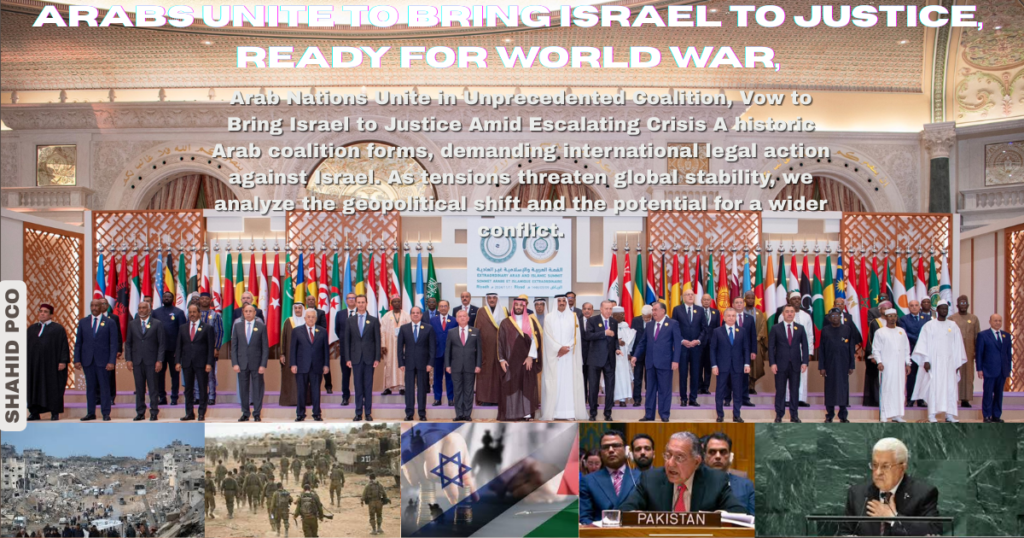
Header Image Alt Text: Leaders of Arab nations stand together at a summit table with maps of the Middle East, looking solemn and determined.
In a move that has sent seismic waves through the international community, a coalition of Arab nations has announced a unified front aimed at bringing the State of Israel before international justice for its actions in Gaza and the occupied territories. Declaring themselves “ready for any outcome, including a world war,” the alliance represents the most significant show of pan-Arab military and diplomatic solidarity in decades, fundamentally altering the geopolitics of the Middle East and raising the specter of a global confrontation.
A Historic Show of Unity
For years, the Arab world has been characterized by fragmented interests and competing agendas. However, the ongoing war in Gaza has acted as a catalyst, forging a powerful and unexpected consensus. Spearheaded by regional powers including Egypt, Saudi Arabia, Jordan, and Qatar, and backed by non-state actors, this new coalition transcends old divisions.
“This is no longer a conflict; it is a question of fundamental justice,” stated a joint declaration read at an emergency summit in Cairo. “The continuous displacement and casualties of the Palestinian people, the destruction of their infrastructure, and the blatant disregard for international law and UN resolutions can no longer be met with mere condemnation. We are united in our pursuit of accountability through every available international legal mechanism.”
The Legal and Diplomatic Offensive
The coalition’s strategy is multi-faceted, focusing on a powerful legal and diplomatic push:
- International Court of Justice (ICJ) and ICC: Member states are pooling resources to launch and support major cases at the International Court of Justice and the International Criminal Court. The goal is to charge Israeli officials with war crimes, crimes against humanity, and the crime of apartheid.
- UN General Assembly Mobilization: Leveraging their numerical strength, the bloc is orchestrating a campaign within the United Nations to pass resolutions isolating Israel diplomatically and potentially seeking its suspension from international bodies.
- Economic and Political Isolation: A coordinated effort to enforce boycotts, divestment, and sanctions (BDS) on a scale never before seen is underway, targeting governments and corporations that provide military or economic support to Israel.
Military Posturing and the “Red Line”
While the primary stated focus is legal, the coalition’s military readiness is unmistakable. Joint exercises along the borders of Israel and in strategic waterways like the Red Sea have been conducted. The statement that they are “ready for a world war” is interpreted by analysts as a direct message to Israel’s allies, particularly the United States, that any further escalation or ground invasion of key areas like Rafah could be a red line triggering a massive regional response.
“This isn’t 1967 or 1973. The military capabilities of these nations, particularly their missile arsenals and drone technology, are vastly more advanced,” explains Dr. Lena Farrow, a senior fellow at the Global Security Institute. “They are not necessarily signaling an imminent invasion, but they are making it unequivocally clear that the cost of continued conflict for Israel and its backers will be prohibitively high. They are weaponizing the threat of escalation to force a diplomatic solution
Global Reactions and the Risk of Wider War
The international response has been one of extreme alarm.
- United States & NATO: The White House has called for “immediate de-escalation,” reaffirming its “ironclad” commitment to Israel’s security while urgently engaging in shuttle diplomacy to prevent a miscalculation that could draw in American forces.
- European Union: Deeply divided, the EU is struggling to form a coherent response, balancing its support for Israel’s right to self-defense with growing horror at the humanitarian crisis and now the real risk of a continent-wide economic and security disaster.
- Russia & China: Both nations have issued statements calling for calm, but are also leveraging the crisis to critique American leadership in the region and position themselves as alternative power brokers.
The fear among world leaders is that a single incident—a misplaced strike, a naval skirmish, or a targeted assassination—could ignite a chain reaction that draws in Iran, its proxy networks (Hezbollah, the Houthis), and ultimately the United States and its allies, creating a scenario reminiscent of the conflict spirals that led to previous world wars.
Conclusion: A Point of No Return?
The formation of this Arab coalition marks a pivotal moment in history. The path forward is fraught with peril. The pursuit of justice through international law offers a potential peaceful avenue, but the concurrent military brinkmanship creates an incredibly volatile environment.
The world now watches and holds its breath. The question is no longer just about Gaza or Israel, but whether the international community can navigate this crisis without plunging the entire globe into a conflict of unimaginable scale. The message from the Arab world is clear: the status quo is unacceptable, and they are prepared to risk everything to change it
👉👉 Are Arab countries going to form a bloc like NATO? Is Pakistan going to lead👈👈

